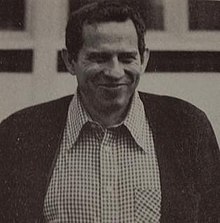music.wikisort.org - Composer
Aldo Clementi (25 May 1925 – 3 March 2011) was an Italian classical composer.

Life
Aldo Clementi was born in Catania, Italy. He studied the piano, graduating in 1946 at the Conservatorio Santa Cecilia in Rome. His studies in composition began in 1941, and his teachers included Alfredo Sangiorgi and Goffredo Petrassi. After receiving his diploma in 1954 again at the Conservatorio Santa Cecilia, he attended the Darmstadt summer courses from 1955 to 1962. Important influences during this period included meeting Bruno Maderna in 1956, and working at the electronic music studio of the Italian radio broadcaster RAI in Milan.[1]
Poesia de Rilke (1946) was the first work of his to be performed (Vienna, 1947). Of more significance was the premiere of Cantata (1954), which was broadcast by North German Radio (Hamburg) in 1956. In 1959 he won second prize in the ISCM competition with Episodi (1958), and in 1963 he took first prize in the same competition, with Sette scene da "Collage" (1961).[1]
He taught music theory at the University of Bologna from 1971 to 1992.[1]
Clementi died on 3 March 2011 in Rome.[2]
Style
In 1983 David Fanning described Clementi's style of decelerating canons as "sharing in the widespread post-serial depression of the 1970s",[3] while in 1988 Paul Griffiths referred to the "Alexandrian simplicity of his solution to the current confusion in music.[4] Clementi himself described his works as "an extremely dense counterpoint, relegating the parts to the shameful role of inaudible, cadaverous micro-organisms".[4]
His music has been featured at Ultima, the Oslo Contemporary Music Festival (2009),[5][dead link] performed and recorded by ensembles including Trio Accanto, the Quatuor Bozzini,[1] the Ives Ensemble[6][dead link] and the Contemporary Music Ensemble of Wales[7] and broadcast by BBC Radio 3.[7][8]
Selected works
- Episodi (1958) for orchestra
- Ideogrammi n. 1 (1959) for 16 instruments
- Triplum (1960) for flute, oboe and clarinet
- Collage (1961) – stage work
- Informel 2 (1962) for 15 performers
- Collage 2 (1962) for electronics
- Informel 3 (1961–63) for orchestra
- Intavolatura (1963) for harpsichord
- Variante A (1964) for mixed chorus and orchestra
- Concerto (1970) for piano and 7 instruments
- Concerto (1975) for piano, 24 instruments and carillons
- Clessidra (1976) for chamber orchestra
- L'orologio di Arcevla (1979) for 13 performers
- Variazioni (1979) for viola solo
- Capriccio (1979–1980) for viola and 24 instruments
- Dodici variazioni (1980) for solo guitar
- Fantasia su roBErto FABbriCiAni (1980–81) for flute and tape
- Es (1981) – stage work
- Parafrasi (1981) 18 voice canon realized with processor
- Adagio (1983) for quintet with prepared piano
- Ouverture (1984) for 12 flutes
- Concerto (1986) for piano and 14 instruments
- Fantasia (1987) for 4 guitars
- Tribute (1988) for string quartet
- Berceuse (1989) for orchestra
- Romanza (1991) for piano and orchestra
- The Plaint (1992) for female voice and 13 instruments
- Wiegenlied (1994) for soprano and 5 instruments
- Tre Ricercari (2000) for saxophone, piano and celesta/vibraphone/tubular bells
- Sonate Y. (2002) for solo violin
References
- "Aldo Clementi". Quatuor Bozzini. Archived from the original on 6 July 2011. Retrieved 30 January 2010.
- "Aldo Clementi 1925–2011". Il Giornale della Musica. Archived from the original on 2011-07-19. Retrieved 5 March 2011.
- David Fanning (July–October 1983). "Recent Italian Music". Music & Letters. 64 (3–4): 320.
- Paul Griffiths (1988). "Music Reviews: Italian". The Musical Times. 129. JSTOR 965322.
- "Aldo Clementi". Ultima 09: Oslo Contemporary Music Festival. Archived from the original on 6 November 2009. Retrieved 30 January 2010.
- "Omaggio a Aldo". Ives Ensemble. Archived from the original on 24 July 2011. Retrieved 30 January 2010.
- "Italians 1 of 2". Hear and Now. BBC Radio 3. 9 October 2004. Retrieved 30 January 2010.
- "Italian Music for Voices, Pianos and Percussion". Pre-Hear. BBC Radio 3. 30 January 2010. Retrieved 30 January 2010.
Further reading
- Clementi, Aldo, Maria Rosa De Luca, Salvatore Enrico Failla, and Graziella Seminara. 2005. Per Aldo Clementi: nell'occasione dei suoi ottant'anni, 25 maggio 2005. Catania: Università degli studi di Catania. OCLC 122259602
- Cresti, Renzo. 1990. Aldo Clementi: studio monografico e intervista. Milan: Edizioni Suvini Zerboni. OCLC 28429364
- Lux, Simonetta, and Daniela Tortora. 2005. Collage 1961: un'azione dell'arte di Achille Perilli e Aldo Clementi. Luxflux proto type arte contemporanea, Documenti 1. Rome: Gangemi. ISBN 88-492-0779-4
- Mattietti, Gianluigi. 2001. Geometrie di musica: il periodo diatonico di Aldo Clementi. Lucca: Libreria musicale italiana. ISBN 88-7096-294-6
- Osmond-Smith, David. 1981. "Aux creux néant musicien: Recent Work by Aldo Clementi". Contact, no. 23:5–9.
- Osmond-Smith, David. 2001. "Clementi, Aldo". The New Grove Dictionary of Music and Musicians, second edition, edited by Stanley Sadie and John Tyrrell. London: Macmillan.
- Seminara, Graziella, and Maria Rosa De Luca (eds.). 2008. Canoni, figure, carillons: itinerari della musica di Aldo Clementi: atti dell'incontro di studi, Facoltà di lettere e filosofia, Catania, 30–31 maggio 2005. Milan: Suvini Zerboni. ISBN 978-88-900691-5-4.
- Zaccagnini, Michele. 2016. "Deus ex Machina: Uncovering Aldo Clementi's System". Perspectives of New Music 54, no. 1 (Winter): 137–178.
На других языках
[de] Aldo Clementi
Aldo Clementi (* 25. Mai 1925 in Catania; † 3. März 2011 in Rom) war ein italienischer Komponist. Er schrieb Bühnen-, Orchester- und Chorwerke, Vokal- und Kammermusik sowie Elektronische Musik.- [en] Aldo Clementi
[es] Aldo Clementi
Aldo Clementi (Catania, 25 de mayo de 1925 – 3 de marzo de 2011), fue un compositor italiano de la segunda mitad del siglo XX.[ru] Клементи, Альдо
Альдо Клементи (итал. Aldo Clementi; 1925—2011) — итальянский композитор.Другой контент может иметь иную лицензию. Перед использованием материалов сайта WikiSort.org внимательно изучите правила лицензирования конкретных элементов наполнения сайта.
WikiSort.org - проект по пересортировке и дополнению контента Википедии